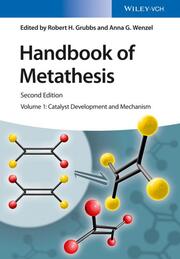Detailansicht
Handbook of Metathesis
Catalyst Development and Mechanism, Handbook of Metathesis 1
ISBN/EAN: 9783527339488
Umbreit-Nr.: 7511063
Sprache:
Englisch
Umfang: 448 S., 500 s/w Illustr., 25 farbige Illustr., 525
Format in cm: 2.7 x 25.2 x 17.7
Einband:
gebundenes Buch
Erschienen am 04.02.2015
Auflage: 2/2015
- Zusatztext
- InhaltsangabePreface HIGHOXIDATION ON STATE MOLYBDENUM AND TUNGSTEN COMPLEXES RELEVANT TO OLEFIN METATHESIS Introduction New Imido Ligands and Synthetic Approaches Bispyrrolide and Related Complexes Monoalkoxide Pyrrolide (MAP) Complexes Reactions of Alkylidenes with Olefins Olefin and Metallacyclopentane Complexes Tungsten Oxo Complexes Bisaryloxides Other Constructs Conclusions ALKANE METATHESIS Introduction Alkane Metathesis by Single-Catalyst Systems Alkane Metathesis by Tandem, Dual-Catalytic Systems Conclusion DIASTEREOCONTROL IN OLEFIN METATHESIS: THE DEVELOPMENT OF Z-SELECTIVE RUTHENIUM CATAYLSTS Introduction The Challenge of Z-Selective Olefin Metathesis Previous Strategies A Serendipitous Discovery Catalyst Studies Applications of Z-Selective Ru Metathesis Catalysts Conclusion RUTHENIUM OLEFIN METATHESIS CATALYSTS SUPPORTED BY CYCLIC ALKYL AMINOCARBENES (CAACs) Introduction Properties and Preparation of CAAC Ligands CAACSupported, Ruthenium Olefin Metathesis Catalysts Summary SUPPORTED CATALYSTS AND NONTRADITIONAL REACTION MEDIA Introduction Supported Catalyst Systems Olefin Metathesis in Nontraditional Media Conclusions INSIGHTS FROM COMPUTATIONAL STUDIES ON d0 METAL-CATALYZED ALKENE AND ALKYNE METATHESIS AND RELATED REACTIONS Introduction Alkene Metathesis Alkyne Metathesis Alkane Metathesis Outlook COMPUTATIONAL STUDIES OF RUTHENIUM-CATALYZED OLEFIN METATHESIS Introduction Computational Investigations of Non-Chelated Ruthenium Catalysts Computational Investigations of Chelated, Z-Selective Ruthenium Catalysts Accuray of the Computational Methods INTERMEDIATES IN OLEFIN METATHESIS Introduction MetathesisActive, EarlyMetal Metallacycles Intermediates in Ruthenium-Catalyzed Olefin Metathesis Future Directions FACTORS AFFECTING INITIATION RATES Introduction Grubbs Second-Generation Catalyst GrubbsHoveydaType Precatalysts Pyridine Solvates Piers Catalysts Indenylidene Carbene Precatalysts ZSelective Catalysts HerrmannType, BisNHCs Conclusions DEGENERATE METATHESIS Introduction Degenerate Metathesis Mechanisms Degenerate Metathesis with Early Transition-Metal Catalysts Degenerate Metathesis with Ruthenium Catalysts Beneficial Effects of Degenerate Metathesis Conclusions MECHANISMS OF OLEFIN METATHESIS CATALYST DECOMPOSITION AND METHODS OF CATALYST REACTIVATION Introduction Decomposition of Mo and W Imido Alkylidene Catalysts and Related Complexes Decomposition of Ru Alkylidene Catalysts and Related Complexes Conclusions SOLVENT AND ADDITIVE EFFECTS ON OLEFIN METATHESIS General Introduction Solvent Effects on Olefin Metathesis Additive Effects on Olefin Metathesis Summary METATHESIS PRODUCT PURIFICATION Introduction Chromatographic and Chemical Removal of Ruthenium Removal by Complexation Conclusion RUTHENIUM INDENYLIDENE CATALYSTS FOR ALKENE METATHESIS Introduction The Initial Development of Indenylidene Metal Complexes for Alkene Metathesis Binuclear Indenylidene Ruthenium Catalysts Arising from Ruthenium(arene) Complexes Preparation of Ruthenium Indenylidene Catalysts from RuCl2(PPh3)3 Ruthenium Catalysts Bearing a Chelating Indenylidene Ligand Conclusion
- Kurztext
- The tremendous success of the metathesis reaction over the last decade is reflected in its huge impact on organic, polymer, and organometallic chemistry. It is highly reliable and produces few by-products, making it environmental friendly. Beside its academic use, many industrial applications in petrochemistry, agro- and pharmachemistry, as well as in the field of fine chemicals and material science have been developed and further underscore the importance of this fascinating reaction. This second edition of the "bible" in this field has been completely updated and now features more than 80% new content, with the focus on new developments in the field, especially in industrial applications. No other book covers the topic in such a comprehensive manner and in such high quality. Edited by the Nobel laureate R. H. Grubbs, and A. G. Wenzel, this volume focuses on catalyst development and mechanism. With a list of contributors that reads like a "Who's-Who" of metathesis, this is an indispensable one-stop reference for chemists in academia and industry. Other volumes available: Volume 2: Applications in Organic Synthesis, Editors: R. H. Grubbs and D. J. O´Leary Volume 3: Polymer Synthesis, Editors: R. H. Grubbs and E. Khosravi
- Autorenportrait
- Robert H. Grubbs received his Ph.D. from Columbia University for work with Ron Breslow. After a postdoctoral year with Jim Collman at Stanford University, he joined the faculty at Michigan State University. In 1978, he moved to the California Institute of Technology, where he is now the Victor and Elizabeth Atkins Professor of Chemistry. Among many other awards, he received the Nobel Prize in 2005 for his research on the metathesis reaction. His research interests include polymer chemistry, organometallic catalysis, and the development of new synthetic organic methodology. Anna G. Wenzel received her PhD at Harvard University under the guidance of Prof. E. N. Jacobsen. From 2003 to 2006, she joined the group of Prof. R. H. Grubbs as an NIH Postdoctoral Scholar. In 2006, she joined the faculty as an Assistant Professor at the W. M. Keck Science Department in Claremont, California. In 2012, she was promoted to Associate Professor. Her research topics are asymmetric catalysis, organometallic chemistry, and organic synthesis.
